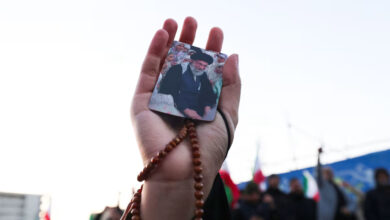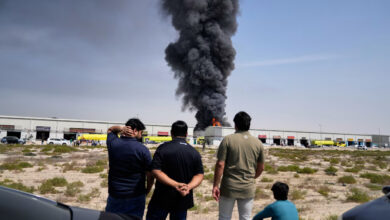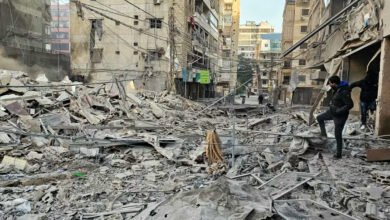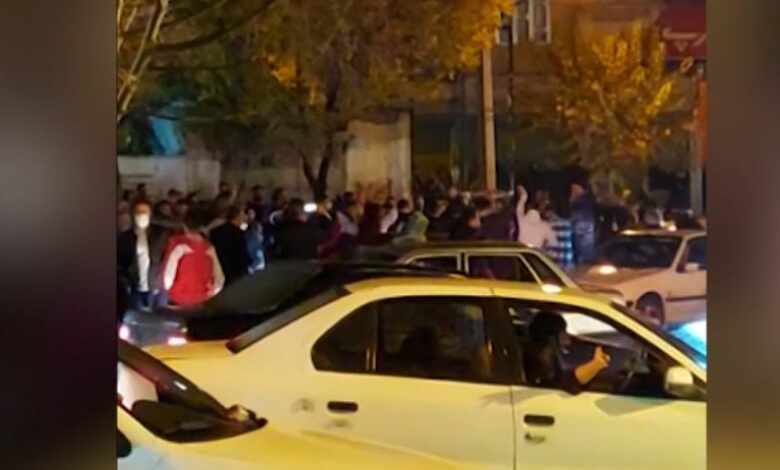
Iran’s World Cup defeat to the United States was met by cheers and celebrations in Tehran and other Iranian cities on Tuesday evening, as protesters hailed the country’s exit from the tournament as a blow to the ruling regime.
The nation was eliminated from the tournament in Qatar after its 1-0 loss on Tuesday, ending a campaign that has been overshadowed by anti-government protests that have raged for months at home.
But there are concerns about the safety of the Iranian players returning home across the Persian Gulf, after the team initially refused to sing Iran’s national anthem before their first game in an apparent show of solidarity with demonstrators. The team’s families were also threatened with imprisonment and torture in advance of the match, a source involved in the security of the games said.
People in several Iranian cities celebrated from inside their homes and residential buildings moments after the final whistle, which came in the early hours of Wednesday local time, while videos posted on social media showed people honking their car horns, chanting and whistling.
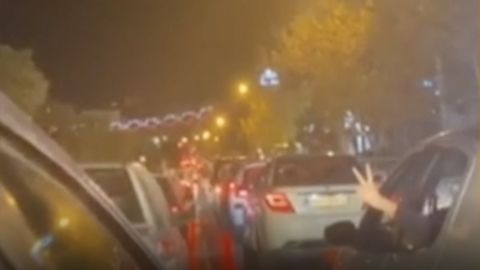
“I am happy, this is the government losing to the people,” one witness to celebrations in a city in the Kurdish region, who CNN is not naming for security concerns, told CNN on Wednesday.
The Norway-based Iranian rights group Hengaw posted several videos of similar scenes. “People in Paveh are celebrating Iran’s national team lose over America in World Cup in Qatar, they are chanting ‘Down with Jash (traitors),” Hengaw said in a post.
Demonstrations have rocked Iran for several months, sparking a deadly clampdown from authorities. The nationwide uprising was first ignited by the death of Mahsa (also known as Zhina) Amini, a 22-year-old Kurdish-Iranian woman who died in mid-September after being detained by the country’s morality police. Since then, protesters across Iran have coalesced around a range of grievances with the regime.
The United Nations High Commissioner for Human Rights Chief, Volker Turk, has said that the country is in a “full-fledged human rights crisis” as authorities crack down on the protests.
Football has become an increasingly heated flashpoint in recent weeks, with the World Cup throwing a global spotlight on the turmoil inside the country.
Iran’s national side would have progressed to the second round of the World Cup with a win or draw against the US, but the team will now travel home after its group stage exit.
“I’m really sorry on behalf of our players, our group, that we couldn’t get our opportunity to qualify for the next round,” midfielder Saeid Ezatolah told reporters after the game. “I hope our fans and our people in Iran, they forgive us. And I feel just sorry, that’s it.”
The team’s return will be closely watched amid fears that the players could face retribution for a perceived brief show of support for the protests, which drew international attention and praise from human rights groups.
The country’s flag and national anthem have been rejected by protesters as symbols of the current regime. And, following the refusal of Iranian players to sing Iran’s national anthem in their opening match against England on November 21, a source involved in the security of the games told CNN that the players were called to a meeting with members of the Iranian Revolutionary Guard Corps (IRGC).
The source said that they were told that their families would face “violence and torture” if they did not sing the national anthem or if they joined any political protest against the Tehran regime.
The players sang the anthem on Tuesday, and before their second game against Wales last Friday, which saw 2-0 victory for Iran.
Hours before the game kicked off on Tuesday, Iranian authorities said a former member of the national soccer team, Parviz Boroumand – who was arrested this month over criticism of the government – was released on bail, according to state news agency IRNA.
Boroumand had been arrested in mid-November during protests in Tehran, Iranian media outlets reported. Earlier on Tuesday, Iranian-Kurdish footballer Voria Ghafouri was also released on bail.
Iranian football legend Ali Karimi, sometimes referred to as the “Asian Maradona,” has meanwhile said he has received death threats through his family members after he vocally supported protests.
The government has described him as one of the “main leaders” of the demonstrations, and issued a warrant for his arrest in early October charging him with “harmonizing with the enemy” and “encouraging riots,” according to Iran’s Supreme Council of the Judiciary, both charges that are punishable by death.
CNN’s Sam Kiley and Hamdi Alkhshali contributed reporting


